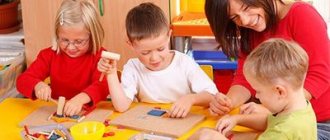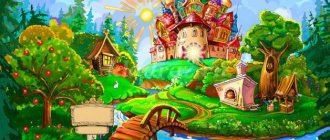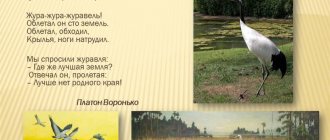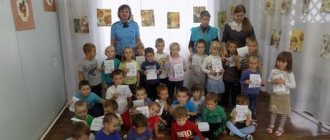MAGAZINE Preschooler.RF
PERSPECTIVE PLANNING TAKEN INTO ACCOUNT OF THE FSES IN THE PREPARATORY GROUP.Winner of the all-Russian competition “The most popular article of the month” October 2016
Conditions of the competition:
Authors:
- Taranyuk Maria Vasilievna.
- Evseenko Tamara Ivanovna
Municipal preschool educational institution, a general developmental kindergarten with priority implementation of activities for the artistic and aesthetic development of children No. 109.
Educator. Komsomolsk-on-Amur, Khabarovsk Territory
SEPTEMBER 1 WEEK TOPIC: “MEMORY OF SUMMER”
TASKS: to summarize and systematize children’s knowledge about the characteristic features of summer, about work in nature (in the garden), about summer fun, about the life of the flora and fauna in the summer.
ORGANIZED JOINT EDUCATIONAL ACTIVITIES EDUCATIONAL ACTIVITIES DURING REGULAR MOMENTS
COGNITIVE DEVELOPMENT Cognitive development
Topic: “Memories of Summer”
Etc. tasks: To summarize and systematize the idea of summer according to the main essential features (thunderstorm, rainbow, lightning), about the characteristics of the life of animals in the forest, to clarify the idea of certain types of agricultural labor in the summer; develop the ability to establish a connection between a set of conditions (heat, light, moisture and plant condition); cultivate a desire to share your knowledge and memories with peers.
Mathematics
Etc. tasks: Practice counting within 10; assign numbers from 0 to 10; ordinal counting; practice comparing objects by length and width; repeat the composition of the number; learn to answer in sentences, use plural nouns correctly; develop the ability to understand and independently perform a given task; cultivate endurance.
Pomerantseva str. 14 No. 1, No. 2
Search and research activities.
Topic: "Water Filtration" .
Etc. tasks: to introduce children to the processes of water purification in different ways (sand, rag, blotting paper"; Develop reasoning skills, establish cause-and-effect relationships. Foster a caring attitude towards water.
- D/i “Insects” - to consolidate children’s knowledge about insects, the structure of their body, benefits for humans, nature.
- D/i “When does this happen?” - develop observation skills.
-D/i “Seasons” - teach to see signs of seasonal changes in the weather, plants, animal behavior, life and work of people.
— D/i “Bees and Flowers” — develop attentiveness and interest in nature.
— Lotto “Wildlife” — teach to distinguish different types of plants.
-Butterfly watching
— D/n “Numbers” — repeat numbers from 0 to 10.
- D/i “Similar - not similar” - exercise in comparing objects by shape, color, size.
Regional component
Topic: “Plants of the Khabarovsk Territory” - introduce rose hips, note that in the Far East it is called “Daurian Rose” , cultivate interest in the flora of the Far East.
Experimental activities
“Smell, taste, touch, listen” - to consolidate children’s ideas about the senses, their purpose (ears - to hear, recognize various sounds; nose - to detect smell; fingers - to determine the shape, structure of the surface; tongue - to determine taste).
| Next > |
Long-term planning for speech development in the preparatory group
Long-term plan
Educational field "Cognitive development"
direction “Speech Development”
of the preparatory group.
| Month | Subject | Program content |
| September 1-2 week | Monitoring | Identify children’s knowledge, skills in this section at the beginning of the school year. |
| 3 week | “Summer Stories” G., 19 | Help children compose a story from personal experience, select nouns for adjectives. |
| Storytelling based on the picture “To school” Ushakova 44 | Develop in children the ability to compose a plot story based on a picture using the acquired knowledge about the composition of the story (plot, climax, denouement); learn to invent events without the help of a teacher. | |
| 4 week | Compiling a story based on the painting “For Mushrooms, For Berries” Internet - resources | Learn to carefully examine the picture, draw up a description plan, and according to the plan, consistently compose a story based on the picture. |
| “What are poems for?” Internet resources | Talk with children about why people write, read and recite poetry. Find out which program poems children remember. | |
| October 1 Week | Reading A. Remizov’s fairy tale “The Voice of Bread.” D/i “I - for you, you - for me” G. 33 | Introduce children to A. Remizov’s fairy tale “The Voice of Bread”, find out whether the children agree with the ending of the work. Improve children's ability to reproduce the sequence of words in a sentence. |
| Compiling a story based on the painting “Harvesting Bread” Kylasova | Teach children to answer questions, make a plan and consistently compose a story based on the picture. | |
| 2 weeks | “In a forest clearing” G., 32 | Develop children's imagination and creativity, activate their speech. |
| Consideration of the plot painting “In the Forest in Autumn.” Internet resources | Learn to look at a picture, ask questions, answer them with complete answers, and write a short story. | |
| 3 week | Poems by P. Komarov about the Far East region. Internet resources. | Continue to introduce children to the poetry of Far Eastern writers. |
| “Golden Rigma” V. Sysoev. Reading chapters from a book. | Introduce children to local historian, hunter, writer, honorary citizen of Khabarovsk, director of the local history museum Vsevolod Petrovich Sysoev | |
| 4 week | Lexico-grammatical exercises. G., 22 | Activate children's diverse vocabulary. Help to accurately characterize the subject and construct sentences correctly. |
| Educational fairy tale “Green Hedgehog” Internet resources. | To acquaint children with the appearance, structure, and growing conditions of indoor plants; develop curiosity and educational interest. | |
| November 1 Week | “The History of the Book” Internet - resources | Give children knowledge of how to do it book ; enrich vocabulary: lumberjack, mill, sawdust, printing house, artist, rafting, bookstore, cuneiform, papyrus, birch bark, parchment, scrolls, lumberjack, bookbinder; introduce children to the history of book creation and materials , from which they are made, separate components to form children’s ideas about the need to be careful when working with books; introduce safe reading rules, develop interest in books , careful attitude towards them. |
| “Tall Tales - Changelings” G., 35 | To introduce children to folk and original fables, to make them want to come up with their own fables. | |
| 2 weeks | Coming up with a fairy tale on the theme “The Hare’s Birthday” Ushakova 58 | Teach children to independently invent a fairy tale on a given topic using expressive means of language (description, dialogue), to develop the ability to compose a fairy tale according to plan. |
| Retelling of the story “Late Autumn”. | Introduce children to Iris Revno’s story “Late Autumn.” Learn to answer questions and retell the text. | |
| 3 week | “Winged Friends” G., 70 (story based on the series of paintings “Titmouse”) Kylasova | Continue to teach how to write interesting and logical stories about wintering birds, explain why it is necessary to feed birds in winter. |
| Memorizing the poem by V. Zvyagin “Sparrow” | To develop children's memory, to instill a love for their native nature and land. | |
| 4 week | Retelling of the story by V. Sukhomlinsky “Apple and Dawn” G., 39 | Improve the ability to retell and draw up a retelling plan |
| Reading the story by V. Sukhomlinsky “The most affectionate hands.” Internet resources | Learn to ask and answer questions, listen carefully to the text. | |
| December 1 Week | O. Poveshchenko. “Trouble came unexpectedly...” Internet - resources | Introduce a poem about the noble and dangerous profession of a firefighter. To help children determine what qualities a firefighter should have; people in this profession should be brave and courageous. To develop respect for the firefighter profession, as well as the attention and memory of children. |
| Composing a coherent story “If I were an artist” by Ushakov 64 | Teach children to invent a story using subjunctive verbs. | |
| 2 weeks | “Hello, guest winter!” Internet resources | Introduce children to poems about winter. |
| Compiling the story “Winter” based on a series of plot pictures Kylasova Internet resources | Strengthen the use of adjectives and indirect cases of nouns in speech. Continue learning how to write a short story using reference words and pictures. Practice selecting attributes for objects. Develop children's communication skills and friendships. | |
| 3 week | Farm. Domestic animals and their young. Kylasova Reading stories “Horse”, “Goat” | Clarify and generalize knowledge about domestic animals, consolidate the names of professions. |
| Getting to know the work of E.I. Charushin Retelling the story " Bear cubs» Internet resources | To introduce the writer’s work, his works about nature and animals. Continue learning to retell the work. | |
| 4 week | Reading the fairy tale “12 months” by S. Marshak Internet resources | Introduce S. Marshak’s fairy tale “12 months”, teach to listen carefully, answer the teacher’s questions |
| Telling the fairy tale “Snow Maiden” Internet - resources | Introduce children to a folk tale, the image of the Snow Maiden | |
| 5 week | Russian folk toy Kylasova | Introduce R.N. toys. Reinforce knowledge of the name of the material from which toys are made. Introduce folk craftsmen and folk crafts. |
| Compiling a story based on the painting “The Snowman” Kylasova | Learn to look at a picture, answer questions, consistently describe a picture, composing a story. | |
| January 2 week | "New Year's Meetings" G., 54 (winter fun) Kylasova | Improve children's ability to write stories from personal experience. Activate the speech of preschoolers. |
| Reading the Russian folk tale "Nikita Kozhemyaka" Internet resources | Recall Russian folk tales with children. Introduce the Russian folk tale “Nikita Kozhemyaka”. Help identify fabulous episodes in a fairy tale | |
| 3week | Retelling of the story “Yolka” Kylasova | Introduce children to the story “Yolka” by M. Zoshchenko Learn to answer questions and retell the text. Answer the question: what are the benefits of eating for the human body? |
| A story about health... “Who is more useful”, proverbs about health Internet resources | Teach children to reason, draw conclusions, explain the meaning of proverbs. | |
| 4 week | Inventing the continuation and completion of L. Penevskaya’s story “How Misha Lost His Mitten” | Teach children to develop the story started by the teacher, without repeating the stories of other children. To activate complex sentences of various types in children’s speech using conjunctions and allied words. |
| Compiling a story based on the painting “The Dressmaker” Kylasova | Strengthen your knowledge of the names of professions. | |
| February 1 Week | “Conversation: A.S. Pushkin" Internet resources | Tell children about the great Russian poet; evoke a feeling of perception and a desire to hear other works of the poet. |
| "The Tale of the Priest and His Worker Balda" Internet resources Learning an excerpt from a fairy tale | Listen to the work without being distracted, answer questions about the text, memorize the passage you like. | |
| 2 weeks | To be healthy and strong... Fairy tale "The Magic Nose" Internet resources | Be careful when reading a fairy tale, highlight the main idea, learn to draw conclusions, what needs to be done in order for a person to be healthy. |
| Retelling of the fairy tale “About Nuts” Internet resources | Introduce children to the story, teach them to answer questions and retell the text, teach them to draw conclusions and answer the main question of the story. | |
| 3 week | Defenders of the Fatherland Day Kylasova | Clarify children's knowledge about the army, their ideas about the branches of the military, military equipment and military professions |
| Compiling a story based on a series of pictures “Dog is an orderly” Kylasova | Learn to look at the pictures carefully, writing a story about a dog - a helper, about a dog - a savior. | |
| 4 week | Retelling the story “Bees on reconnaissance” (based on object pictures) | Teach children to find the main idea of a work, teach them to retell without leading questions. |
| Early spring. Examination of the plot picture. Internet resources | Clarify the time of year, the names of the spring months, the characteristic signs of early spring; practice the formation of words with diminutive and affectionate suffixes - ochk, - echk, -onok, - enok. | |
| March 1 Week | "Spring day March 8" Internet resources | Expand children's understanding of the spring holiday - March 8; improve the ability to read poems expressively; cultivate love and respect for all women. |
| Looking at the painting “Congratulations to mom, dear mom!” Internet resources | To consolidate and clarify children’s knowledge about the holiday; develop the ability to compose a story according to plan, select related words. | |
| 2 weeks | "Maslenitsa. History of the holiday" Internet resources | Continue to introduce children to Russian folk holidays, consolidate the names of the days of Maslenitsa week. |
| “Wow, Maslenitsa!” M/f | When watching films, be attentive, answer the questions posed with complete answers, and tell the episode you liked. | |
| 3 week | Looking at the painting “Birds of Migratory” Internet resources Memorizing the poem “The Singers Are Returning” by G. Ladonshchikov | Continue to introduce children to migratory birds, develop children’s dialogical speech, develop the skill of writing a descriptive story, and develop children’s memory |
| Fairy tale “Birds of Migratory” with presentation Internet resources | Expand your understanding of migratory birds of your native land, the characteristics of their feeding and arrival in the spring; cultivate a love of nature, remember that birds must be protected; develop attention, memory, thinking. | |
| 4 week | Reading the fairy tale “The Wolf and the Seven Little Goats” | Introduce R.N. fairy tale “The Wolf and the Seven Little Goats”, teach to listen carefully, answer the teacher’s questions. |
| Dramatization of the fairy tale “The Wolf and the Seven Little Goats” | Teach children to transform into fairy tale characters, memorize text, and play fairy tale characters. | |
| April 1 Week | Retelling of the fairy tale “How “Kolobok was catching up with his sister” (based on object pictures) Kylasova | Teach children detailed retelling using object pictures. |
| "Road signs" Internet resources | Expand and consolidate children's knowledge about traffic lights and rules traffic ; | |
| 2 weeks | Retelling of the story “The First Cosmonaut of the Earth” Internet - resources | Teach children to find the main idea of a work, teach them to retell without leading questions, consistently. |
| "The first woman astronaut" Internet resources D/i “Name something that is related to space...” | To consolidate knowledge about space and astronautics, expand knowledge about the first woman cosmonaut, Valentina Tereshkova , continue to consolidate knowledge about the constellations; | |
| 3 week | "In the Far North" Kylasova | To introduce the living conditions of animals in the Far North, to learn how to write descriptive stories about animals of the North. |
| Animals of hot countries. Kylasova | Clarify the names of animals of hot countries and their young, external signs, their structure, what they eat, characteristic habits. Learn to select epithets and synonyms. | |
| 4 week | Retelling by V. Suteev “How I Fished” Internet resources | Teach children attentiveness, respect for other people's hobbies and the ability to behave unnoticed when the situation requires it. Answer questions with complete answers, continue to learn to retell the text. |
| Reading the story “Karasik” by N. Nosov Internet resources | Introduce the work of N. Nosov, teach how to answer questions, and retell a passage you like. | |
| 5 week | Memorizing the poem “Insects” by O. Kiseleva. Riddles, puzzles. Internet resources | Develop children's memory, teach them to solve puzzles and riddles. |
| Looking at the painting “Wasps and Bees” Internet resources | When looking at a picture, teach to see the beauty that the artist wanted to convey, learn to describe what he saw and write a short story. | |
| May 1 Week | Victory Day Internet resources | Expand children's understanding of the Victory Day; about the heroes of the Great Patriotic War. |
| "Remembering the war..." Memorizing a poem about war | We sing the memory of our heroes in poetry... | |
| 2 weeks | Profession: museum worker, tour guide. Internet resources | Give an idea of the work of museum workers, tour guides, and archival workers; people studying the history of their country, region, city. |
| Monitoring | Identify children’s knowledge, skills and abilities in this section at the end of the school year. | |
| 3 week | “Native land – forever beloved!” Internet - presentation | Continue to introduce children through a presentation to the history of the Khabarovsk Territory |
| Monitoring | Identify children’s knowledge, skills and abilities in this section at the end of the school year. | |
| 4 week | “We live in the city of Military Glory” Internet - presentation | Continue to introduce children to the history of their hometown through a presentation about Khabarovsk. |
| Monitoring | Identify children’s knowledge, skills and abilities in this section at the end of the school year. |
Literature:
Gerbova V.V. “Speech development in kindergarten, preparatory school group for children
garden", M. Mosaic - Synthesis, 2014
Kylasova L.E. “Speech development: lesson notes for the preparatory group”,
Volgograd, “Teacher”, 2020
Ushakova O.S., Strunina E.M. “Speech development of children 6-7 years old” Program.
Guidelines. Lesson notes.
Games and exercises M, “Ventana - Count”, 2008
Downloaded from www.znanio.ru
Preparatory group. Senior preschool age. Children 6-7 years old
Long-term plan for entertainment and leisure for the school year in the preparatory group for school Long-term plan for entertainment and leisure for the 2021-2022 school year in the preparatory group for school September Leisure “In Search of Knowledge”
.
Goal: to consolidate children’s understanding of school, lessons, school supplies Entertainment “All children should know the rules of the road”
October...
Plan of work with parents “Age characteristics of children 6–7 years old” SEPTEMBER 1. Article “Age characteristics of children 6–7 years old”
To acquaint parents with the age characteristics of children, to acquaint parents with the tasks and goals of teaching and raising children in the preparatory group. Teachers of group 2. Questioning of parents “On the way to ...



